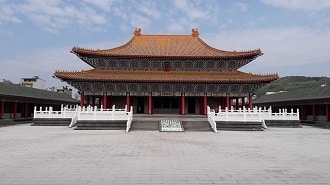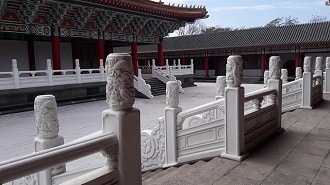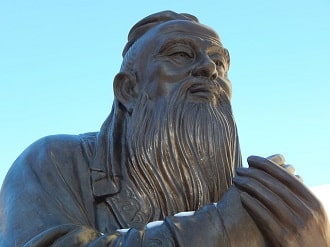This is the full text of the statement prepared by Professor Tu Weiming of the International Confucian Ecological Alliance (ICEA) and announced at the ARC meeting in Trondheim, Norway in July 2013.
I. A virtuous, responsible and caring life
Confucian humanism sees its primary role to be the promotion of education designed to enable people to become truly human. Its purpose is the cultivation of a virtuous, responsible and caring person. Learning to be genuinely and fully human is an end in itself. Simultaneously it is also a dynamic and transformative process of self-realization, social engagement and cultural creativity.

As Confucius said:
“Even though you have only coarse grain for food, water for drink, and your bent arm for a pillow, you may still be happy. Riches and honours without justice are to me as fleeting clouds.”
This process is set within the greater context of humanity and Heaven. It is well expressed in The Great Learning:
“Only when personal lives are cultivated are families regulated; only when families are regulated are states governed; only when states are governed is there peace all under Heaven. Therefore from the Son of Heaven to the common people, all, without exception, must take self-cultivation as the root.”
II. An ethos of responsibility and care
Confucian humanism is aptly characterized as an ethic or ethos of responsibility and care. As Wing-tsit Chan (陈荣捷) notes in his celebrated Source Book in Chinese Philosophy,
“If one word could characterize the entire history of Chinese philosophy, that word would be humanism – not the humanism that denies or slights a Supreme Power, but one that professes the unity of man and Heaven. In this sense, humanism has dominated Chinese thought through the dawn of its history.”
The notions of reciprocity and benevolence are of great importance in Confucian humanism. Such principles can be traced back to Confucius himself who, when questioned by Lord Ji Kang as to how he could make his people respectful, loyal and zealous, replied that he should:
“Approach them with dignity and they will be respectful. Be [him]self a good son and kind father, and they will be loyal. Raise the good and train the incompetent, and they will be zealous.”
Wang Yangming (1472-1529) wrote in his Inquiry on the Great Learning:
“The great man regards Heaven and Earth and the myriad things as one body. He regards the world as one family and the country as one person. As to those who make a cleavage between objects and distinguish between self and others, they are small men. That the great man can regard Heaven, Earth and the myriad things as one body is not because he deliberately wants to do so, but because it is natural to the humane nature of his mind that he do so.”
III. Working through the structures of the world rather than rising above them
The principle spiritual exercise of Confucianism is self-cultivation whose practice leads to true selfhood. Through following this virtue, we embrace or enable family cohesiveness, social solidarity, national integrity, and world peace. It provides an authentic possibility of transcending selfishness, nepotism, parochialism, ethnocentrism, nationalism, regionalism, and anthropocentrism.
Success in this matter is dictated by an ethic of responsibility informed by a transcendent vision. We do not become “spiritual” by departing from or transcending above our earth, body, family, and community, but by working through them. Indeed, our daily life is not merely secular but a response to an onto-cosmological decree. Since the Mandate of Heaven that enjoins us to take part in the great enterprise of cosmic transformation is implicit in our nature, we are Heaven’s partners, and thus we can embody the creativity and spirituality of heaven through personal self-knowledge.
IV. Humanity as a partner with both Heaven and Earth

Confucianism sees humankind to have a deep and cosmic significance. This significance manifests itself in partnership with both Heaven and Earth forming the classic Chinese trinity of Heaven Earth and Humankind, together manifesting the true embodiment of nature itself. The Doctrine of the Mean succinctly captures the essence of this cosmological thinking:
“Only those who are the most sincere [authentic, true and real] can fully realize their own nature. If they can fully realize their own nature; they can fully realize human nature. If they can fully realize human nature, they can fully realize the nature of things. If they can fully realize the nature of things, they can take part in the transforming and nourishing process of Heaven and Earth. If they can take part in the transforming and nourishing process of Heaven and Earth, they can form a trinity with Heaven and Earth.”
Zhang Zai in the 11th century wrote a brief essay that is the basis of Neo-Confucian ethics. The Western Inscription (whose name comes from the fact that it was inscribed on the west wall of his study) states that:
Heaven is my father and Earth is my mother, and even such a small creature as I find an intimate place in their midst.
Therefore that which fills the universe I regard as my body and that which directs the universe I consider as my nature.
All people are my brothers and sisters, and all things are my companions.
Even though you have only coarse grain for food, water for drink, and your bent arm for a pillow, you may still be happy. Riches and honours without justice are to me as fleeting clouds.
Confucius
V. The Earth is alive
Confucians know that the earth is alive. We observe its presence, appreciate its beauty and participate in its creativity. We therefore share its richness and fecundity with all life on the “Blue Planet”. Wang Yangming also states:
“When we see a child about to fall into the well, we cannot help a feeling of alarm and commiseration. This shows that our humanity (ren) forms one body with the child. It may be objected that the child belongs to the same species. Again, when we observe the pitiful cries and frightened appearances of birds and animals about to be slaughtered, we cannot help feeling an “inability to bear” their suffering. This shows that our humanity forms one body with birds and animal. It may be objected that birds and animals are sentient beings as we are. But when we see plants broken and destroyed, we cannot help a feeling of pity. This shows that our humanity forms one body with plants. It may be said that plants are living things as we are. Yet even when we see tiles and stones shattered and crushed, we cannot help a feeling of regret. This shows our humanity forms one body with tiles and stones.”
However, humankind has repeatedly abused this beautiful gift by exploiting it recklessly, ignoring the Confucian notion of balance and harmony.
Mencius said:
“The woods on Ox Mountain were once beautiful On account of its being on the edge of a large country, it had been attacked with axes and hatchets, and then how could it remain beautiful? The refreshing breezes of day and night, and the moisture provided by rain and fog, did not fail to give rise to sprouts of vegetation. But cows and sheep have been repeatedly pastured there, and for that reason it has remained desolate. People observe its denuded state and assume that it never had any good resources. But how could this state be the true nature of this mountain?”

VI. The world is a precious inheritance
What Mencius reminds us is a core Confucian value that this world is a precious heritage passed on to us from our ancestors and it is a resource entrusted to us by numerous generations yet to come.
The sage, namely, a human who has attained the highest stage, is similar to Heaven and Earth and therefore his conduct would not violate Heaven and Earth. His knowledge is comprehensive of all ten thousand things and his way will save all under Heaven. Even in acting in terms of special considerations, he does not deviate from rectitude (cheng).
VII. A sustainable harmonious relationship between humans and nature
The idea of the unity of Heaven and Humanity implies four inseparable dimensions of the human condition: self, community, nature and Heaven. The full distinctiveness of each enhances rather than impedes, a harmonious integration of the others. The self, as a centre of relationships, establishes its identity by interacting with community variously understood, from the family to the global village and beyond. A sustainable harmonious relationship between the human species and nature is not merely an abstract ideal, but a concrete guide for practical living.

Confucians believe that our human nature comes from Heaven and that the Way of Heaven is accessible through self-knowledge. They also believe that to understand the Mandate of Heaven we must continuously cultivate ourselves. This completes the triad of Heaven, Earth and humankind. Nature is as an unending process of transformation rather than a static presence, and as such is a source of inspiration by which we understand the dynamism of Heaven. As the first hexagram in the Book of Change symbolizes, Heaven’s vitality and creativity are without end and we humans must emulate its ceaseless vitality and creativity.
The sense of “awe and reverence before the universe” is prompted by our aspiration to respond to the ultimate reality that makes our lives purposeful and meaningful.
Whether we come from a creationist or an evolutionist perspective, we are indebted to “Heaven, Earth and the myriad things” for our existence. To repay this dept we cultivate ourselves so as to attain our full humaneness amidst the wonder of existence.
VIII. Just do what is right and proper and then all will be well
From these Confucian values, comes not just academic study but considered action. The ethos of Confucius has guided China in the past. Its teachings, translated into action can now do the same for the future. The following are areas we will now explore and around which we will create a programme of action. As the Classic of Documents says in chapter 22:
Just do what is right and proper and then all will be well.
The brief statement can be found here
For other faith’s statements on the environment, please click here
Copied with permission from the Alliance of Religions and Conservation (ARC) www.arcworld.org
ICSD works on a global basis, with current engagement in Africa, the Middle East, North America, and Europe.
